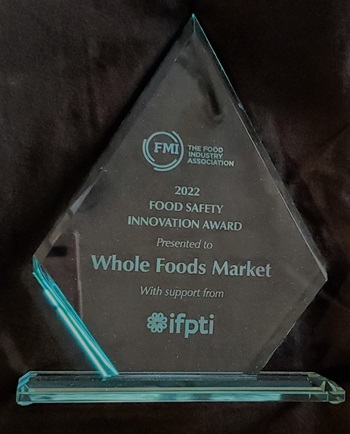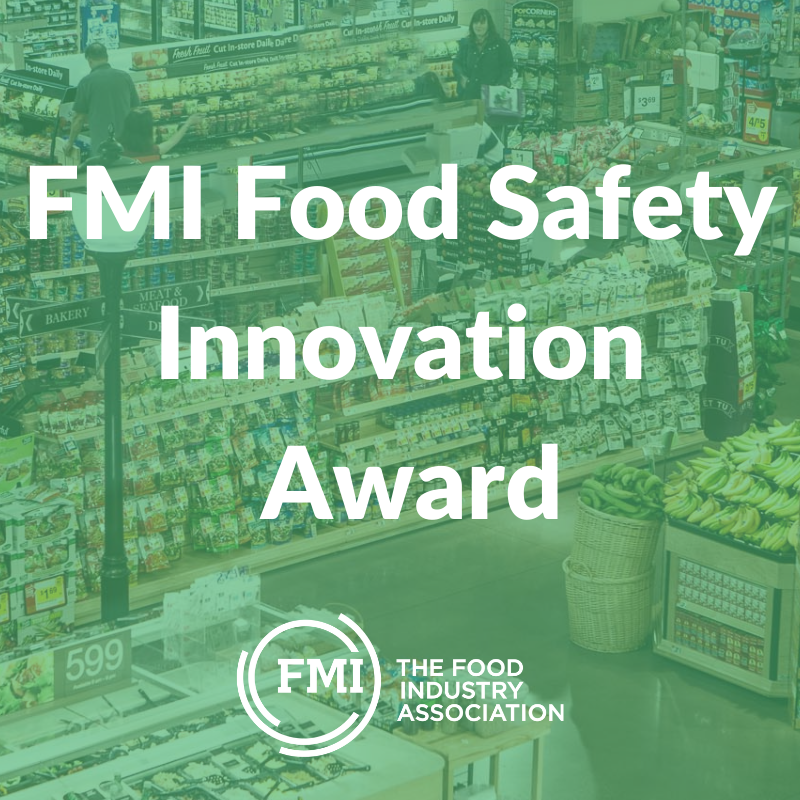 The food industry faces a number of food safety challenges: supply chain disruptions, labor shortages, and changing consumer practices and preferences. The growing number of challenges only magnifies the importance of implementing best practices and having a strong food safety management system to safeguard the food supply and protect public health. “A strong food safety culture is a prerequisite to effective food safety management,” according to FDA’s New Era of Smarter Food Safety Blueprint. The food industry is leveraging innovative solutions to strengthen food safety culture and support the advancement of food safety.
The food industry faces a number of food safety challenges: supply chain disruptions, labor shortages, and changing consumer practices and preferences. The growing number of challenges only magnifies the importance of implementing best practices and having a strong food safety management system to safeguard the food supply and protect public health. “A strong food safety culture is a prerequisite to effective food safety management,” according to FDA’s New Era of Smarter Food Safety Blueprint. The food industry is leveraging innovative solutions to strengthen food safety culture and support the advancement of food safety.
FMI supports the advancement of food protection technologies and best practices throughout the supply chain in order assure our food is the safest it can be. In partnership with the International Food Protection Training Institute (IFPTI), we created the FMI Food Safety Innovation Award to recognize companies that have made an innovative contribution and commitment to food safety and to encourage others to search for creative solutions and implement new practices in continuing to keep our food the safest it can be.
At our January 2022 FMI Food Protection Committee Meeting, we recognized Whole Foods Market with the FMI Food Safety Innovation Award. Whole Foods Market has built a strong food safety culture that strives for continuous improvement. They demonstrate a commitment to strengthening food safety that goes beyond compliance. Driven from the top, starting with senior management and extending through to all employees, food safety is integrated throughout the Whole Foods Market organization. By adopting an innovative, systematic approach to food safety, Whole Foods Market seeks to raise the bar when it comes to food safety to ensure they are always delivering the safest, highest quality products to their customers.
To highlight key aspects of their innovative food safety program, I interviewed Jeff Edelen, Vice President, Retail Food Safety at Whole Foods Market.
Ashley: How does Whole Foods Market maintain the trust of its customers?
Jeff: Trust is about integrity in your brand and people; it’s about being consistent in satisfying and delighting customers with each experience. At Whole Foods Market, we focus on delivering the highest quality products and to do that, you must ensure product safety is a part of that commitment.
Ashley: How would you describe the food safety culture at Whole Foods Market?
Jeff: Whole Foods Market prioritizes food safety, and it’s a big part of our culture. It’s a great example of one of our company’s leadership principles: “shared fate, with self-responsibility.” To quote our company, “As stakeholders in the company we share in the successes, as well as setbacks. Team Members have the responsibility for their own successes and failures.” We want our Team Members to share in the success of delighting our customers with a fantastic experience and help each other out to effectively manage the food safety process controls we have in place. I’m extremely fortunate to work with an outstanding food safety team to help nurture that culture.
Ashley: What role does the food safety culture at Whole Foods Market have on the effectiveness of the food safety program?
Jeff: In 2021, we rolled out Food Safety Empowerment Teams (FSET) in all stores. The key word there is “empowerment” because we want all Team Members to feel empowered and engaged to own our food safety processes and raise questions, offer new ways of thinking, and help the whole team be successful. Food safety is not one person’s responsibility, it’s a true team effort. The more people we have focused and committed to it, the more effective the program will be.
Ashley: How does a culture of continuous improvement impact food safety at Whole Foods Market?
Jeff: An industry peer shared many years ago that “food safety is a journey, not a destination,” and that’s so true. There are always things for the food industry to continue to improve upon to ensure a safe food supply, including upstream supplier controls and downstream processing controls. We continue to look at all ways to imbed food safety into our thought processes whether that’s part of Team Member training, internal and external auditing programs, store design, equipment purchasing, technology development, packaging, or data collection.
Ashley: As the winner of the 2022 FMI Food Safety Innovation Award, what does the future of food safety look like for the food industry?
Jeff: I’m very excited about the future as I continue to see technology develop, and our industry remain focused on reducing risks to consumers. There is still a lot to learn and new strategies to consider. Working with industry partners like FMI and other industry stakeholders to share information is key to our future success.
FMI Food Safety Innovation Awards


 Industry Topics address your specific area of expertise with resources, reports, events and more.
Industry Topics address your specific area of expertise with resources, reports, events and more.
 Our Research covers consumer behavior and retail operation benchmarks so you can make informed business decisions.
Our Research covers consumer behavior and retail operation benchmarks so you can make informed business decisions.
 Events and Education including online and in-person help you advance your food retail career.
Events and Education including online and in-person help you advance your food retail career.
 Food Safety training, resources and guidance that help you create a company food safety culture.
Food Safety training, resources and guidance that help you create a company food safety culture.
 Government Affairs work — federal and state — on the latest food industry policy, regulatory and legislative issues.
Government Affairs work — federal and state — on the latest food industry policy, regulatory and legislative issues.
 Get Involved. From industry awards to newsletters and committees, these resources help you take advantage of your membership.
Get Involved. From industry awards to newsletters and committees, these resources help you take advantage of your membership.
 Best practices, guidance documents, infographics, signage and more for the food industry on the COVID-19 pandemic.
Best practices, guidance documents, infographics, signage and more for the food industry on the COVID-19 pandemic.
